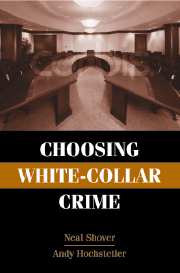4 - Self-Restraint and Oversight
Published online by Cambridge University Press: 05 June 2012
Summary
Lure becomes criminal opportunity in the absence of credible oversight. When the criminally predisposed and the momentarily tempted sense attentiveness by others, they move on. In this chapter we suggest that the changes described in chapter 2 coupled with the presence of a large population of the tempted and predisposed produced in the generative worlds sketched in chapter 3 give reason to believe that white-collar crime has increased substantially. It is impossible to estimate the magnitude and parameters of the increase, but the logic of rational-choice theory gives reason to believe it may be substantial.
Self-restraint is the first line of defense against criminal decision making by any who are attracted by lure. This is the willingness of individuals and groups to be constrained in their consideration of options not by fear of legal penalties but instead by potential self-reproach borne of a guilty conscience or concern for the opinions of others. Commitment to norms of morality and ethics, self-respect, and determination not to let down those who look to them for exemplary conduct and community standing are among the most important reasons many obey the law (Paternoster and Simpson, 1993). Lure is seen more quickly as criminal opportunity where decision makers are indifferent to the tug of conscience, reputation, or concern for family and peers. Crime-as-choice theory leads to expectation that fear of adverse publicity restrains the behavior of potential white-collar offenders.
- Type
- Chapter
- Information
- Choosing White-Collar Crime , pp. 76 - 108Publisher: Cambridge University PressPrint publication year: 2005

